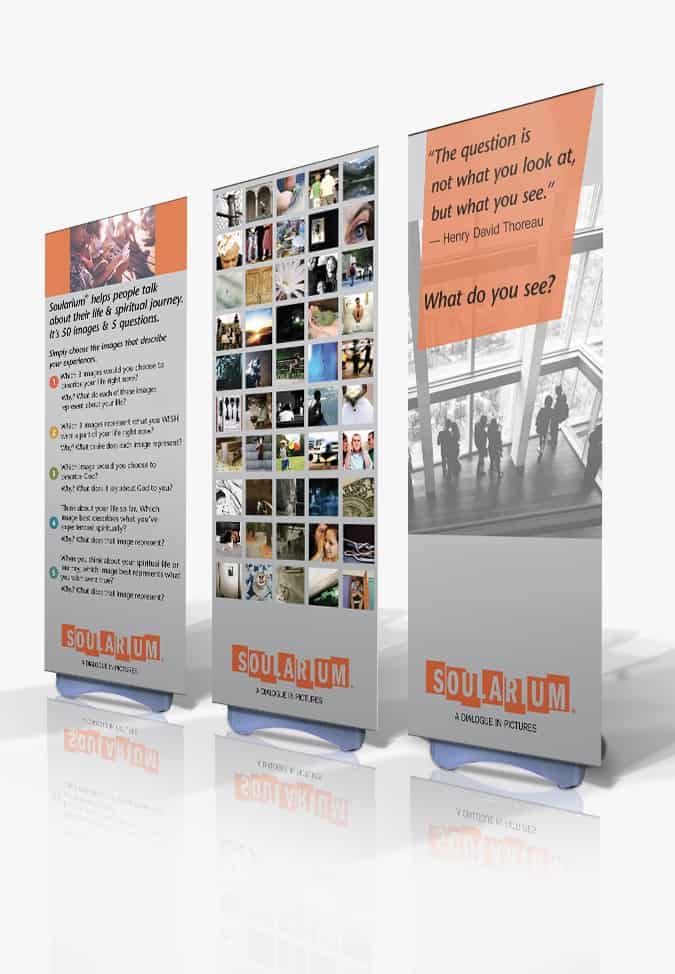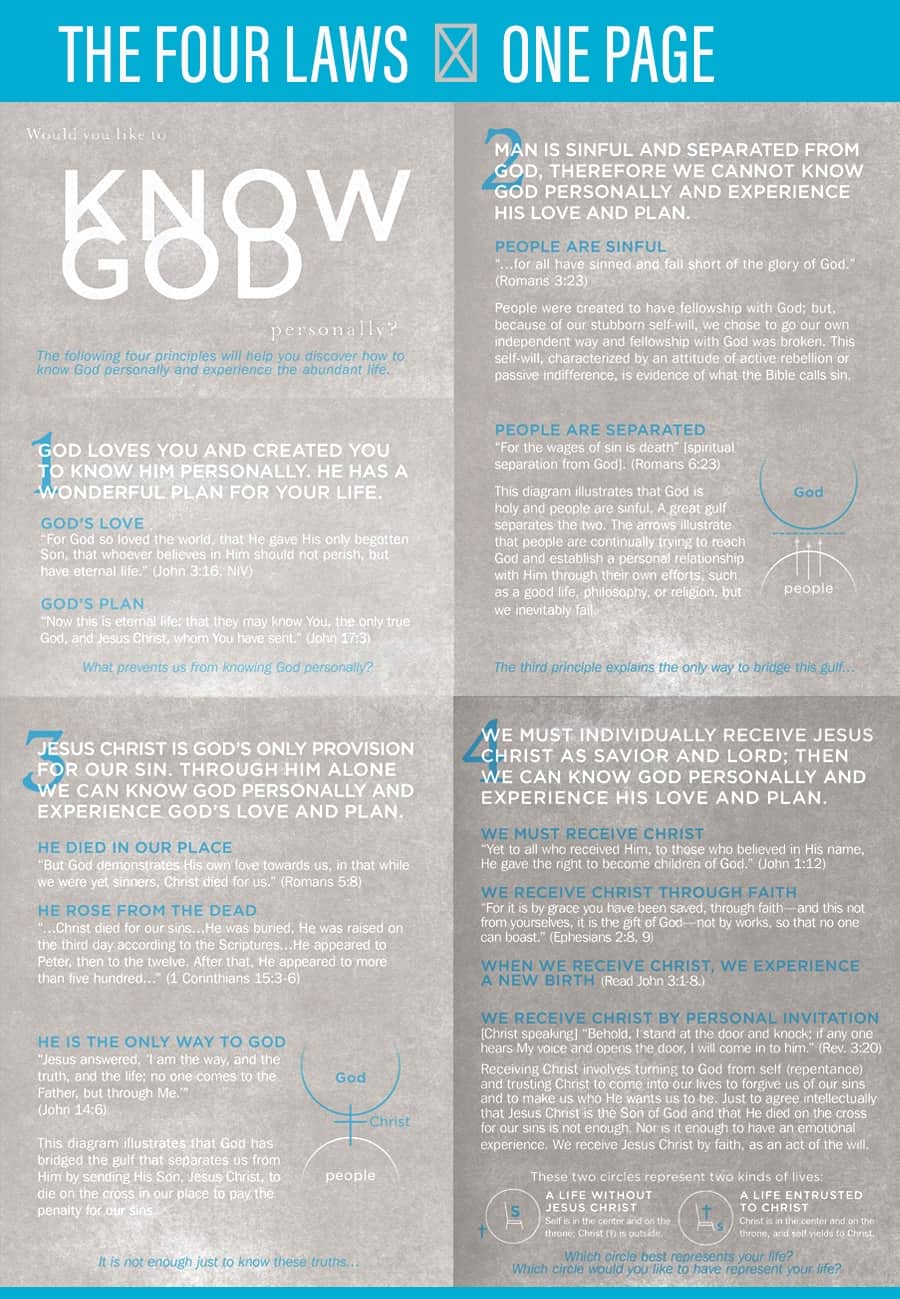How Myers-Briggs Can Help Share the Gospel

In the third and fourth chapters of John's gospel, we find Jesus sharing the good news of the kingdom with two distinctly different individuals. The first was a Pharisee named Nicodemus, who steals away in the dead of the night to visit Jesus (John 3:1–21). The second is a Samaritan woman He meets at Jacob's well (John 4:1–26).
Jesus doesn't launch into a prepared gospel presentation. The conversations flow naturally from their situations and surroundings. Jesus also seems to take into consideration the people He's talking to. The discussion with the learned Pharisee is thoughtful and philosophic, while the Samaritan woman and Jesus have a more plain spoken and earthy conversation.
Sharing the gospel is about more than preparing an arsenal of arguments. We need to have the sensitivity to read our audience and surroundings. It's a dance where we learn to lead and to follow, and we understand the kind of prompts our partner will respond to.
Discovering personality types
Understanding people's personality types can give you a real advantage when sharing your faith with them. When you have a sense of where their boundaries are and the kinds of discussions they respond best to, you can have powerful discussions while avoiding a lot of relational landmines.
The Myers-Briggs Type Indicator (MBTI) is an assessment based on theories developed by psychologist Carl Jung, which was first published in 1943. Since it was added to the Educational Testing Service in 1962, it's estimated that over 50 million people have taken the personality test. It's used by companies, colleges, churches and government agencies to build effective teams and effective organizations. Cru and Jesus Film Project use this assessment to help develop leaders.
The assessment breaks personalities into four dichotomies:
Actions:
- E xtroversion/I ntroversion
Functions:
- S ensing/i N tuition
- T hinking/F eeling
Lifestyle Preferences
- J udging/P erceiving
These dichotomies exist on a spectrum, and as people take the assessment, they fall onto one side or the other. As the test identifies people’s placement in these dichotomies, they will eventually be assigned one of 16 personality types.
The assessment is based on forced-choice (two-option) questions, which helps to identify which of the dichotomies someone prefers. The two-option strategy can remove a lot of nuance. Someone might land on the side of the extrovert, but in truth he or she is closer to the center of the spectrum.
So it's important to remember that—while the MBTI can be a helpful tool—God made each of us incredibly unique. We'll look at these dichotomies as a guideline, but they’re not hard-fast rules about individual behavior.
Understanding where people fall on each of these spectra can help to inform your approach to sharing the gospel with them. A working knowledge of these areas can help you understand why a discussion may or may not be going well.
Extroversion ←→ Introversion
The first letter of each personality type is based on the Extroverted–Introverted dichotomy. The Jungian view of these terms is a little different than the way we tend to use them. It has more to do with the way that people prefer to use their energy. An Introvert’s personality is focused more on the world of ideas, while the Extrovert's energy comes from interaction with people.
Extroversion
- Actively seeks out social activities
- Verbally expressive
- Tends to think out loud
- Likes to be involved in lots of tasks
- Tends to take a broader perspective in discussions
- Outwardly focused
- Tends to speak first and then think
- Prefers face-to-face discussions
- Enjoys taking things as they come
Introversion
- Actively seeks out privacy
- Tends to be more quiet
- Inwardly processing
- Likes to focus on fewer tasks
- Wants to focus on fewer topics with more depth
- Often wrapped up in own thoughts
- Tends to think first and then speak
- Prefers text-based communication
- Wants some advanced warning of changes
5 tips for sharing the gospel with Extroverts:
- The way you communicate matters. Deep, serious discussion is going to have a lot more impact in a face-to-face setting. If you have to interact through text, keep it short and concise, then set up opportunity, one-on-one discussion.
- As much as possible you want the conversations to feel spontaneous and not canned. If you try to create a formalized discussion, you’re likely to turn them off.
- Be ready to cover a lot of ground. Extroverts like to bounce around and talk about ideas as they come up. So don't prep to cover one theological idea too deeply.
- Give the Extroverts plenty of space to think aloud. Allow them to bounce around and try ideas out from multiple angles. They might contradict themselves multiple times, but that’s part of Extroverts’ method of processing.
- One great thing about speaking with Extroverts is that they are generally responsive and not shy about making decisions. You don't need to feel wary about pressing for an immediate action/response - they want to!
5 tips for sharing the gospel with Introverts:
- Pushing Introverts into a discussion that they’re not mentally prepared for will seem incredibly invasive from their perspective. Instead, set up a time to talk, and don’t be afraid to give them a heads-up about the topic.
- Introverts like to prepare for a discussion. Try giving them some reading material so they may think about things in private, and then schedule time to talk.
- Be prepared to delve deeply into a topic. Introverts like to drill down and exhaust a discussion before they move on.
- Don’t mistake their silence for agreement. Introverts process internally. Encourage them to share their thinking with you, or else you may never really know where they stand.
- Don’t press the Introvert to respond or make a decision immediately - it is better to have multiple interactions.
Sensing ←→ Intuition
The Sensing/Intuitive spectrum makes up the second personality-type letter. This trait signals the manner a person processes information. Sensing people prefer the concrete information they pick up from their five senses. They prioritize their experience above the abstract, while Sensing people tend to be pragmatic and fact-oriented.
Intuitives focus more on impressions and discovering patterns in information. They have a tendency to read between the lines and solve problems by looking at ideas and possibilities.
Below, you can see how Sensing and Intuitives contrast in their preference for interpreting their worlds:
Sensing
- Prefers concrete facts
- Likes detailed information
- Focuses on the present and enjoys things as they are
- Very practical and trusting of personal experience
- Has a very step-by-step, sequential thinking process
- Is a realist
- Uses things for the purpose they were intended
- Looks at what’s to be achieved and sets specific goals
- Gravitates toward tried-and-trusted solutions
Intuition
- Prefers exploring abstract ideas and possibilities
- Likes to see the big picture
- Future-oriented and optimistic
- Contributes creative ideas when inspiration strikes
- Has a very random working process
- Is an idealist
- Wants to find a new way to use tools
- Sets general goals that reflect the underlying goal
- Wants to create their own solutions
5 tips for sharing the gospel with Sensors:
- A lot of religious discussion can be focused on abstract ideas. Sensing people need to deal with concrete facts. As much as possible, keep the discussion grounded and practical.
- Share biblical and gospel ideas in a sequential order. Help the Sensor see the logic in your gospel presentation.
- When talking about kingdom living, focus on its immediate benefits. A Sensing person is going to find it easier to connect to ideas about the gospel's effect on day-to-day life than a more abstract idea like eternity.
- Share from your personal experience.
- Help Sensors understand the practical aspects of the gospel and clearly communicate the next steps.
5 tips for sharing the gospel with Intuitives:
- The Intuitive doesn't want to get lost in all of the details. Be able to give an overview of the gospel so he or she can get the big picture.
- Being future-oriented and abstract-friendly, Intuitives are energized by talking about the spiritual and eternal benefits of Christianity.
- Don't fill in all the blanks for Intuitives. They are more engaged if they are able to discover how the aspects of the gospel connect.
- The Intuitive is an idealist, so so try to help him or her see the real-life problems the gospel solves.
- Be prepared for the Intuitive to drive the conversation. It might seem like the conversation is bouncing around randomly, but an intuitive person is cutting out what she perceives as unnecessary steps and information.
Thinking ←→ Feeling
How we make decisions can be described by the Thinking-Feeling pairing. It is easy to assume that Thinkers make rational decisions and Feelers do not. However, these traits are more complex. Essentially, Thinkers choose next steps based on objective analysis while Feelers are driven more by personal values.
A Thinker will analyze pros and cons and probe ideas for inconsistencies. He or she will often be accused of being too robot-like in decision making, and overlook the the human aspect while in a given situation.
On the other hand, a Feeler wants to make the best decision for everyone involved. He or she is concerned about harmony and strives to make the most compassionate decision, which could mean that he or she may often miss (sometimes intentionally) the obvious truths in a situation.
Check out how these traits manifest themselves a bit more practically:
Thinking
- Analyzes a situation
- Approaches things logically and objectively
- The first to recognize the flaws in a practice or situation
- Comes across as detached while they’re processing things
- Makes decisions by identifying the principles involved
- Prefers a long-term view
- Can identify the differences in people’s arguments
- Weighs benefits against costs
- Places importance on competence
Feeling
- Empathizes rather than analyzes
- Approaches things personally and subjectively
- The first to recognize the positives in a situation
- Comes across as over-involved in a situation
- Makes decisions based on personal values
- Prefers an immediate view
- Can identify areas of agreement in people’s arguments
- Weighs impact on people
- Places importance on the experiences of others
5 tips for sharing the gospel with Thinkers:
- Make sure your presentation of the gospel is logical. Be prepared to deal with perceived inconsistencies point by point.
- Work with a Thinker to share the gospel in a logical and objective manner.
- Be wary of emotionally manipulative questions and appeals. Thinkers will instantly become skeptical of the discussion.
- Don’t be afraid of discussing the gospel from a cost vs. benefit perspective.
- The Thinker is the reason apologetics were created. Be prepared to go to the mat over an idea or perspective. Don't be afraid to say, "That’s a great question. Let me think about it and get back to you."
7 tips for sharing the gospel with Feelers:
- The Feeler's views are derived from his principles and not from rational argument. So sharing the gospel with him isn't about pointing out where he is wrong, but helping him discover how their principles are better answered by your perspective. So start by finding the areas you agree and work outward.
- Ensure that they feel appreciated and valued. As soon as they feel like "marks," they will disengage.
- Make the Feeler understand that you recognize and appreciate his values.
- Feelers will respond well to people like them who also believe. Help them discover believers who share their values and insights.
- Demonstrate the gospel's positive impact on people.
- Build your argument on its own merits—do not criticize others' religions or perspectives.
- You don't need to be afraid of disagreement or conflict. As long as you establish your appreciation and respect for the Feeler's position, the discussion has a lot of wiggle room.
Judging ←→ Perceiving
How does one deal with the outside world? This is the question answered with the last dichotomy. Judging types prefer a planned and organized approach to their life, while perceivers tend to be more flexible and spontaneous.
While Judgers prefer to have control over their lives, don't make the mistake of thinking that those strong on "judging" are not mentally or emotionally flexible. This last dichotomy deals with a preference for ordering one's world. Judgers tend to be task- and list-oriented, and are done with work long before a deadline.
On the other hand, Perceivers doesn't like to commit too quickly. They prefer to keep their options open and enjoy a mix of work and play. They find approaching deadlines to be motivating and energizing.
Judgment
- Wants to ensure that work has boundaries and closure
- Embraces structure
- Organizes people and things
- Tends to make firm decisions
- Prefers control over situations (and sometimes people)
- Makes plans and follows them
- Makes decisions quickly and commits to them
- Meets deadlines
- Prefers clarity and avoids ambiguity
Perception
- Wants things open and loose
- Takes things as they come
- Analyzes people and things
- Tends to be flexible
- Prefers spontaneity
- Would like to see work as flexible and casual
- Postpones decisions because they’re always looking for more input
- Procrastinates until the last minute
- Worries that clarity is restrictive
5 tips for sharing the gospel with Judgers:
- Set a time to talk. You'll have a greater chance at success if you include a clear agenda and an end time.
- Don’t spring ideas or discussions on them. They're going to be more engaged if they don't feel like the conversation was a bait and switch.
- By staying focused and on schedule, you communicate respect. Don't let the discussion wander.
- Avoid reopening subjects that have been closed.
- Judgers aren't afraid of commitment, so don't be afraid to push for a decision.
5 tips for sharing the gospel with Perceivers:
- Perceivers prefer to keep things loosely defined. The more your discussion proceeds in a way that a perceiver feels trapped, the more they will disengage.
- Be prepared to re-discuss (sometimes at length) issues that have already been discussed. Perceivers will often have a new thought or fact and need to weave it into what they already understand.
- Help the Perceiver understand the dangers of putting off making a decision.
- Assume the discussion is going to run long, and need to be re-addressed.
- Try not to give the impression that your discussion is an agenda. Look for ways to transition toward the gospel naturally.
Be flexible when sharing the gospel
These indicators come together to form 16 different personality traits. Let's take the example of someone who is an INFP. Their personality is marked by the following traits: Introvert, Intuitive, Feeling, and Perceiver. The descriptions here will come together to create a more unique personality. An INFP will:
- Find and expend energy in private
- Look for patterns in information
- Make principle-centered decisions
- Deal with the world in a loose and spontaneous fashion
You can combine the information in this post to create a strategy for sharing the gospel with this personality type.
The MBTI is fairly well-known, and most people have an idea of what their personality style is. Asking someone what their Myers-Briggs type always leads to a fun discussion and can really help you understand the other person's perspective.
If someone isn't sure, there are many simple, free assessments online that can help someone figure it out. Once you know what someone’s MBTI type is, you're on the way to building a gospel-sharing strategy that speaks their language.

























